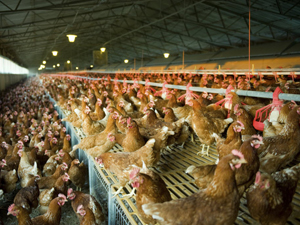Pew Applauds Introduction of Bipartisan Antimicrobial Data Collection Act
 The Pew Charitable Trusts applauded Senators Kirsten Gillibrand (D-NY), Dianne Feinstein (D-CA), and Susan Collins (R-ME), for introducing the Antimicrobial Data Collection Act, which would require the U.S. Food and Drug Administration, or FDA, to report more information on the annual sales of antibiotics used among industrial farm animals. The bipartisan bill would also give the agency a deadline to finalize policies proposed last year to eliminate the use of antibiotics for growth promotion purposes in meat production.
The Pew Charitable Trusts applauded Senators Kirsten Gillibrand (D-NY), Dianne Feinstein (D-CA), and Susan Collins (R-ME), for introducing the Antimicrobial Data Collection Act, which would require the U.S. Food and Drug Administration, or FDA, to report more information on the annual sales of antibiotics used among industrial farm animals. The bipartisan bill would also give the agency a deadline to finalize policies proposed last year to eliminate the use of antibiotics for growth promotion purposes in meat production.
"This bill is critical to helping us understand how antibiotic overuse on industrial farms is affecting human health," says Laura Rogers, director of Pew's effort to reduce antibiotic overuse in food animal production. "While decades of science clearly show that these practices breed drug-resistant bacteria that can infect us, we need to know more about the scope of the problem. Unfortunately, the Senate Health, Education, Labor and Pensions Committee recently missed an opportunity to enhance transparency about antibiotic sales in meat production in the Animal Drug User Fee Act. But we commend Senators Gillibrand, Collins and Feinstein for their bipartisan leadership and urge the Senate to swiftly pass this legislation."
The bill introduced by the three senators includes several provisions to require FDA to report antibiotic sales publicly, comprehensively, and predictably. Under the bill, the agency's reports on these sales would be broken down by dosage form (in feed, in water, or by injection), marketing status (that is, whether they are available over the counter or by veterinary order), and indication of whether the drugs are important in human medicine. FDA would be required to publish the reports by a deadline set each year. The agency issued its 2009 sales report on Dec. 9, 2010, its 2010 report on Oct. 31, 2011, and its 2011 report on Feb. 6, 2013.
In addition, within 180 days of its enactment, the bill would require FDA to finalize a set of policies aimed at eliminating the use of antibiotics for making food animals grow faster. Nearly 220,000 Americans, including leading health advocates such as Pew, have asked FDA to close loopholes in these policy documents and to publish them quickly. Pew has also urged the agency to “issue binding regulations that will further restrict the way antibiotics are used in food animal production.”
In the House, Representatives Henry Waxman (D-CA) and Louise Slaughter (D-NY) on Feb. 26, 2013, introduced the Delivering Antimicrobial Transparency in Animals Act of 2013 (H.R. 820), which also requires FDA to report more detailed antibiotic sales and information on use in food animals.
This bill is critical to helping us understand how antibiotic overuse on industrial farms is affecting human health.Laura Rogers, director of Pew's effort to reduce antibiotic overuse in food animal production.
The Pew Charitable Trusts is driven by the power of knowledge to solve today's most challenging problems. Pew applies a rigorous, analytical approach to improve public policy, inform the public, and stimulate civic life.











